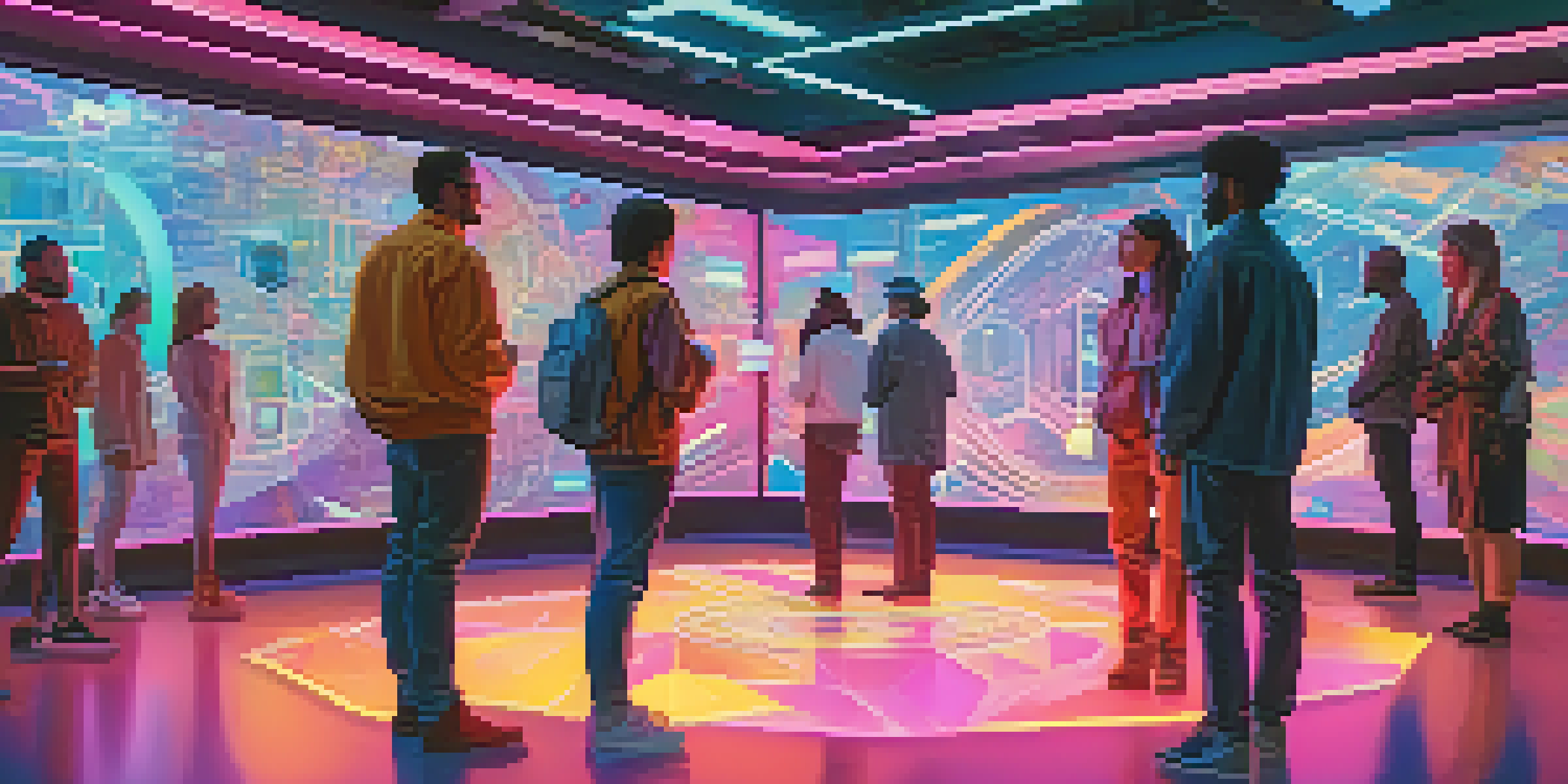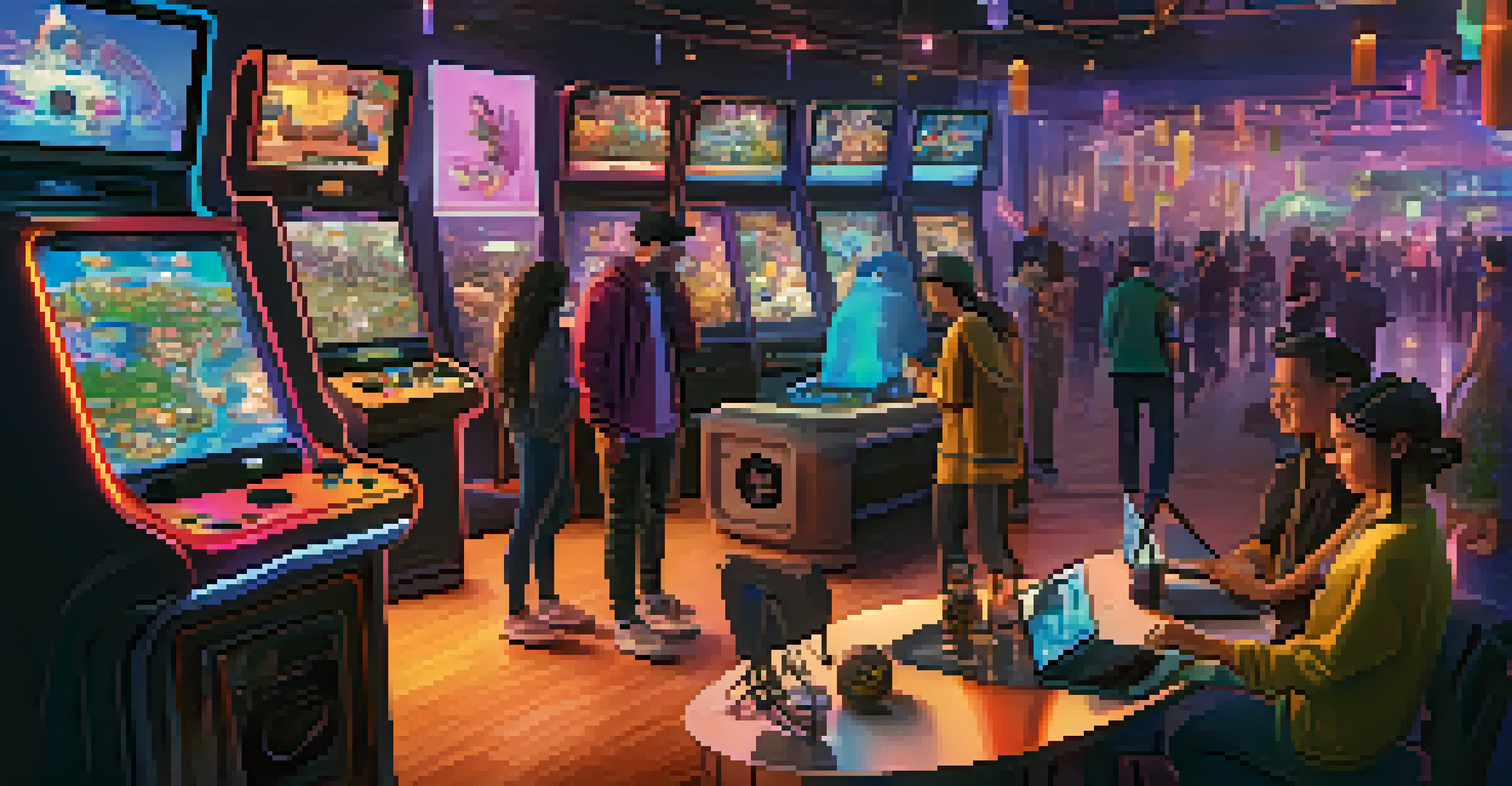The Future of Digital Identity and NFTs

Understanding Digital Identity: A New Frontier
Digital identity refers to the online representation of individuals, encompassing everything from social media profiles to digital wallets. As our lives increasingly transition online, it becomes essential to establish a trustworthy and secure digital persona. This identity affects how we interact, transact, and connect with others in the digital realm.
In a world where digital presence is paramount, your online identity is your most valuable asset.
The rise of blockchain technology has introduced a new layer of security and transparency to digital identities. Unlike traditional methods, which can be easily hacked or manipulated, blockchain offers a decentralized approach, ensuring that personal data remains within the control of the individual. This shift represents a significant evolution in how we perceive and manage our identities online.
In this context, NFTs (non-fungible tokens) emerge as a revolutionary tool for establishing unique digital identities. By linking ownership of digital assets to a specific wallet, NFTs provide a verifiable way to claim ownership and authenticity, paving the way for a more secure digital identity landscape.
The Role of NFTs in Establishing Ownership
NFTs are unique digital assets that represent ownership of a specific item or piece of content, verified through blockchain technology. This uniqueness is crucial in a world where digital copies can be easily reproduced, allowing creators and owners to establish their rights clearly. For example, an artist can sell an NFT of their artwork, ensuring that the original piece is recognized and valued appropriately.

As digital identities evolve, NFTs can help users assert ownership over various aspects of their online presence, from social media profiles to digital art collections. This ownership not only empowers individuals but also fosters a culture of authenticity and accountability in digital spaces. Imagine a scenario where your online persona is directly tied to verified assets; it would significantly enhance trust in online interactions.
Digital Identity in the Blockchain Era
Blockchain technology enhances security and control over digital identities, shifting how we manage personal data online.
Moreover, this ownership through NFTs can extend to experiences, such as virtual events or unique digital interactions. By owning an NFT, users can gain access to exclusive content or services, further intertwining their digital identity with valuable assets in the online ecosystem.
Digital Identity Verification: Moving Beyond Passwords
Traditional identity verification methods, like passwords or security questions, are often inadequate and vulnerable to breaches. As cyber threats continue to evolve, there's a pressing need for more secure alternatives. NFTs can play a pivotal role in this landscape by offering a robust form of identity verification that is both secure and user-friendly.
The future of the internet is not just about connectivity; it's about creating a trusted digital identity that empowers individuals.
Using NFTs as a form of digital ID allows users to authenticate themselves without relying on easily forgotten or compromised passwords. For instance, imagine logging into a platform by simply connecting your wallet containing your NFT, which verifies your identity instantly. This method not only simplifies the login process but also significantly enhances security.
In addition, NFTs can be linked to various forms of personal data, allowing individuals to control what information they share. By selectively granting access to their digital identity, users can maintain privacy while still engaging with online platforms, striking a balance between security and convenience.
NFTs and Personal Branding in the Digital Age
In today’s digital landscape, personal branding is more important than ever. NFTs offer individuals a unique opportunity to curate and showcase their digital identities, making it easier to stand out in a crowded online space. Just as artists and influencers use social media to build their brands, NFTs serve as a powerful tool to represent personal achievements and values.
By creating and selling NFTs that reflect their skills or passions, individuals can enhance their personal brand while establishing a direct connection with their audience. This could be anything from digital art to exclusive content, allowing followers to engage with their favorite creators in new and meaningful ways.
NFTs Empower Ownership and Branding
NFTs allow individuals to assert ownership over digital assets and enhance their personal branding in a crowded online space.
Moreover, as more people turn to online platforms for work and networking, NFTs can help professionals in different fields differentiate themselves. Imagine having a digital portfolio represented by NFTs that display your projects and achievements—this could become a game-changer for job seekers and entrepreneurs alike.
The Intersection of Gaming and Digital Identity
The gaming industry is one of the most exciting areas where NFTs and digital identity converge. As players invest time and money into virtual worlds, the need for a secure way to represent their identities and assets becomes crucial. NFTs enable gamers to own in-game items, characters, and achievements, creating a sense of true ownership that enhances their gaming experience.
Consider a popular game where players can buy, sell, and trade unique items as NFTs. This not only adds value to the gaming experience but also allows players to build their identities within the game world. The items they own can tell a story about their journey and achievements, fostering a deeper connection to their digital persona.
Furthermore, as gaming communities grow, the ability to showcase one’s collection of NFTs can enhance social interactions. Players can proudly display their unique items and accomplishments, effectively blending gaming with personal branding and digital identity.
Challenges of Digital Identity and NFTs
While the potential of NFTs in shaping digital identity is exciting, several challenges must be addressed. First and foremost is the issue of accessibility; not everyone has the technical know-how to navigate blockchain technology or create NFTs. To truly harness the power of digital identity, we need to ensure that everyone can participate, regardless of their tech skills.
Additionally, the environmental impact of blockchain technology is a growing concern. The energy consumption associated with minting and trading NFTs has raised questions about sustainability. As we move forward, it’s crucial to explore more eco-friendly blockchain solutions to mitigate these effects, ensuring that digital identity remains a sustainable concept.
Navigating Digital Identity Challenges
Addressing accessibility, environmental impact, and security risks is essential for the effective integration of NFTs in digital identity.
Lastly, with the rise of digital identity comes the risk of misuse and fraud. As individuals establish their identities online, they must also remain vigilant about protecting their personal data. Educating users on best practices for digital security will be vital in navigating this new landscape safely.
The Future: A Unified Digital Identity Landscape
Looking ahead, the future of digital identity and NFTs seems promising, with the potential for a more unified and secure online experience. Imagine a world where your digital identity seamlessly integrates across various platforms, allowing for consistent and secure interactions. This could transform how we manage our online presence, making it more intuitive and user-friendly.
As technology continues to evolve, the integration of NFTs into our daily lives could redefine how we perceive ownership and identity. With advancements in blockchain and digital asset management, users may eventually have a comprehensive digital identity that encompasses their achievements, interests, and personal values.

Ultimately, the successful merging of digital identity and NFTs will depend on collaboration among tech developers, businesses, and users. By working together to establish best practices and guidelines, we can create a digital ecosystem that is secure, accessible, and empowering for everyone.